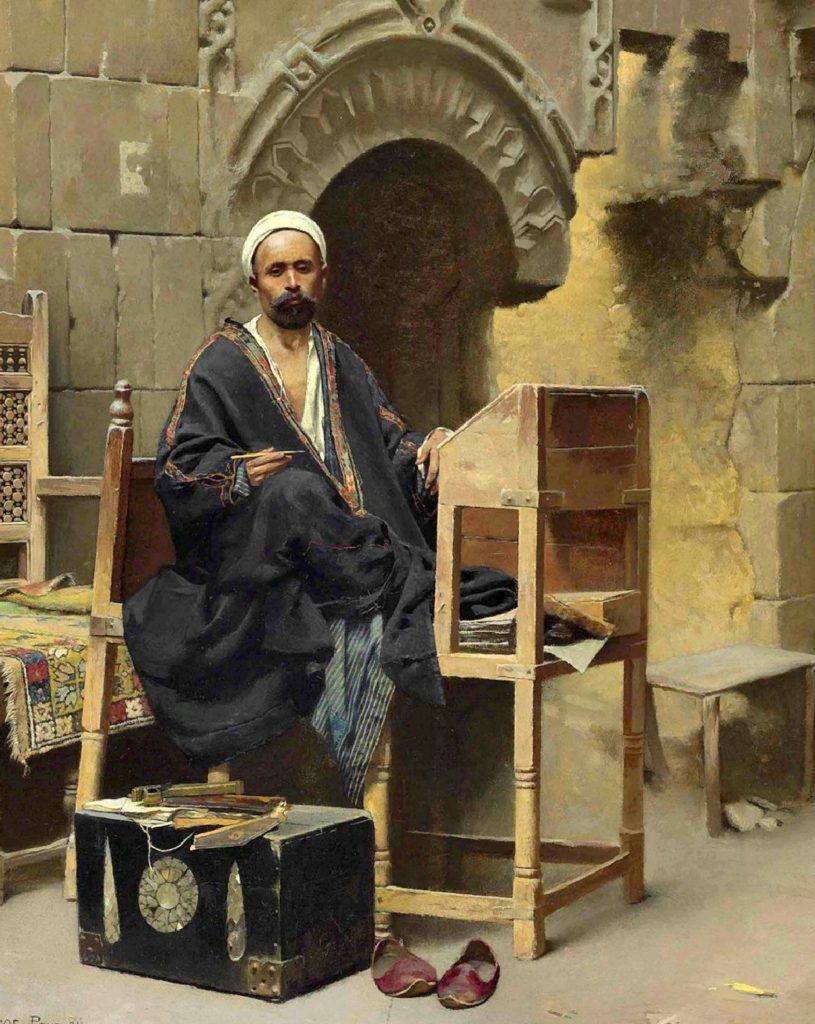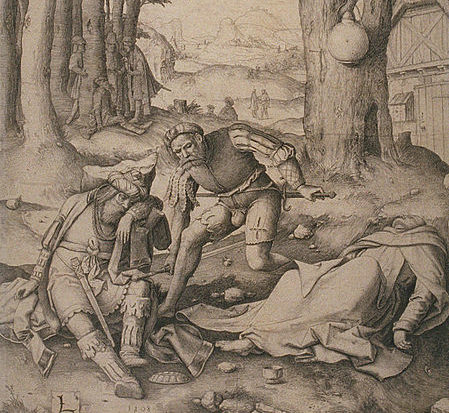
The biography of Islam’s Prophet Muḥammad of Islam compiled by Ibn Isḥāq Muḥammad ibn Isḥāq ibn Yasār ibn Khiyār (80-151 AH) has been the object of much criticism and opprobrium for various reasons. This has placed its credibility under some doubt. Despite all of that, however, this sīra (biography) has remained the principal reference for all of the biographies of the Prophet written subsequently.
LATER OUTSHADOWING the biography of Ibn Isḥāq was the work of Ibn Hishām (ob. 218 AH), who refined it and revised it, and removed fraudulent elements from it.
There is no doubt that Ibn Isḥāq in his sīra – a work that we receive via Ibn Hishām – remains the largest and most extensive source of the Prophet’s biography. Every imām writing a sīra relied on this Ibn Isḥāq. Nevertheless I have added something new, and that is an attempt to document the narrations of Ibn Isḥāq whose chain of authority can be relied upon, and those that Ibn Isḥāq declared he had used, so that the charge of ‘fraudulence’ may be removed, and the incidents related rendered more trustworthy.[1]
However, al-Suyūṭī in his work Naming the Fraudsters indicated that Ibn Isḥāq ‘perpetrated many deceits’. One should note that the original work of Ibn Isḥāq is missing, and as Mājid al-Ḥamdān stated in his book Dāirat al-Afkār Vol. 2: “The author demonstrates that Ibn Hishām constructed his sīra on the missing biography of Ibn Isḥāq”.
Ibn Isḥāq was also accused of outright lying:
A number of harsh criticisms were directed at Ibn Isḥāq. Hishām ibn ‘Urwa ibn al-Zubayr was the first to question the scholarly sincerity of Ibn Isḥāq when he accused him of ‘lying”’ when he quoted some narrations from Fāṭima bint al-Mundhir, Hisham’s wife. Imām Mālik ibn Anas (ob. 179 AH) was the second skeptic as to the sīra of Ibn Isḥāq. In his book Biographies of the Nobles Shams al-Dīn al-Dhahabī (ob. 748 AH) mentions how Ibn Isḥāq was critical of the hadiths of Mālik, and that he was saying to his companions “Fetch me Mālik’s ḥadīth and I will act as doctor to cure its ailments”. Elswhere he stated “Show me Mālik’s scholarship and I will be its vet’. Mālik responded vigorously to those criticisms, saying: « Who is this Ibn Isḥāq? He is just that chief among liars. We kicked him out of Madīna.”[2]
What religion Ibn Isḥāq professed is not known for certain and there is some doubt about it since his ancestors were Christians:
His grandfather Yasār was a Christian Arab captured in the year 12 AH at the battle of ‘Ayn Tamr. When the leader of the Muslims Khālid ibn al-Walīd entered the town he found that forty boys had gathered inside the church busily studying the Gospel. He sent Yasār, the grandfather of Muḥammad bin Isḥāq, along with other captives to Medina, saying that he had become a Muslim![3]
Basing themselves on the sīra by Muḥammad bin Isḥāq, dozens of subsequent biographies of the Prophet were authored, including the Maghāzī of al-Wāqidī (ob.207 AH) the Al-Shamā’il al-Muḥammadiyya of al-Tirmidhi (ob. 279 AH), Jawāmi‘ al-Sīra of Ibn Ḥazm (ob.456 AH). This is because the sīra of Ibn Isḥāq with Ibn Hishām’s corrections and revisions is the only source that exists.
It would have been logical for the Companions of Muḥammad to write his biography
It is clear that, as mentioned earlier, Ibn Isḥāq was accused by some of being a fraudster, a charlatan, and a liar. They said that his religious affiliation was Christian, and some sources even say that his mother was Jewish. So that which is founded on falsity must itself be false. In other words, any source written on the basis of an unreliable source cannot be reliable. For this reason there are some questions to answer:
– It would have been logical for the Companions of Muḥammad to write his biography since they were the closest to him and the most knowledgeable about him, his public life, his conquests, his disputes and his discourses. Similarly his private life, such as the number of his marriages, his maidservants and slaves. And the same applies to personalities such as Abū Bakr, ‘Umar and ‘Alī and the rest of the close Tābi‘īn.[4] But it seems that these were more preoccupied with the Apostasy Wars, with raiding, collecting captives and booty, and the events of the assassination of ‘Uthmān and the subsequent assassinations of the Companions and Muslims internecine struggles for power and wealth. The writing of the Prophet’s biography was therefore delayed by two centuries and written down by people who never even met the great-grandchildren of those who came after the Tābi‘īn. The biography is consequently entirely flimsy.
– The question then remains as to why, for example, Zayd ibn Thābit (12BH – 45AH), who was of high status, did not attempt to write the biography of his Prophet. On this the website قصة الأسلام writes:
The personality of Zayd stood out and he occupied a high place in society. He became the object of respect and reverence among Muslims, as Thābit ibn ‘Ubayd records: “I never saw a man more light-hearted in his own household, or more dignified in council than Zayd”. In general he said that Zayd was a cultured man, following the revelation of the Qur’ān by heart writing down the revelations for the Messenger, supreme in his knowledge and wisdom. When the Messenger set out to communicate his call to the outside world, and send his missives to the kings and Caesars of the earth, he commanded Zayd to learn some of their languages, including Syriac, all of which he duly learnt in a short time.
Another reference on this is that of al-Tirmidhī who said:
According to Zayd ibn Thābit: the Messenger of God said: “I have a number of writings, and I don’t want just anybody to read them. Could you learn Hebrew writing, or Syriac?” To which I replied: “Yes, and I learned them within seventeen days!”[5]
Note that learning a language in seventeen days defies logic, unless he already had some background in Syriac. It is possible to attribute Muḥammad’s lack of interest in a biography to the fact that neither he nor his Companions – Zayd included – had ever come across such a thing as a biography. His concern was to spread the da‘wā and extend his influence over the tribes with the ensuing captivity and spoils gained.
– The same applies to Ibn ‘Abbās (‘Abdullah ibn ‘Abbās ibn ‘Abd al-Muṭṭalib al-Hāshimī, (3 BH – 68 AH). This man was a distinguished Companion, a ḥadīth specialist, a jurist, a ḥāfiẓ (‘memoriser’) of the Qur’ān and an interpreter of it. He was a cousin of the Prophet Muḥammad, and one of the prolific narrators of ḥadīths, said to have narrated 1,660 prophetic ḥadīths. Seventy-five of his ḥadīths are agreed upon and collected in the Ṣaḥīḥs of al-Bukhārī and Muslim. ‘Abdullah ibn ‘Abbās was constantly by the side of the Prophet and recorded narrations from him. The Prophet referred to him saying: “Oh Allah, grant him jurisprudential knowledge in religion and teach him correct interpretation”. He is also to have said: “Oh Allah, teach him the Book, Oh Allah, teach him wisdom”.
Incidents, facts and events cannot be accurate if they are written down two centuries later
The Prophet died when Ibn ‘Abbās was thirteen years old, and he used to interpret the Qur’ān after the death of the Prophet, earning him the titles ‘ink of the Nation’, ‘Translator of the Qur’ān’ and ‘the Ink and the Sea’.[6] Ibn ‘Abbās is considered to be one of Muḥammad’s closest associates, a ‘sea’ and ‘ink’ of knowledge. Now did it not occur to him to write a biography of his cousin Muḥammad the Messenger of Islam?
Given all of the above, does it mean that most, or the majority, of what was written about the Prophet of Islam conflicts with the truth? If it does, it means that an entirely different figure of Muḥammad has to emerge. Logically one would be unreasonable to assume that everything that was written of Muḥammad’s biography was far removed from his actual life. On the other hand, one sees that incidents, facts and events cannot be accurate if they are written down two centuries later, and by people who are not close descendants of the person they are talking about.

Suggested Reading
And even if they were among his descendants, the facts can still not actually be verified due to the long period of time that passed since they took place and the absence of any documents verifying the facts and events of that time. This is because it is subject to the changing circumstances of time and place and due to the writers coming under the influence of social and political developments, and the changes in rulers, caliphs and emirs.
For these reasons I personally think that it would be necessary to go back to this lost copy of Ibn Isḥāq’s biography, to a time before it was refined by Ibn Hishām. This missing copy may indeed have been lost, or may have been deliberately concealed, perhaps by Ibn Hishām himself, because it might have told us about other things than those narrated about Muḥammad. We could thus have compared the original version of Ibn Isḥāq with the modified version of Ibn Hishām and all the subsequent sīra copies, to get a clearer picture of Muḥammad’s character.
[1] From the essay فقه السيرة النبوية by Munīr al-Ghadbān.
[2] Abridged citation from Muhammad Yusrī Abū Hadūr’s article السيرة النبوية لابن إسحاق on the website أضاءات.
[3] Ibn ‘Asākir, History of Damascus.
[4] See Glossary.
[5] Ibn ‘Asākir, Tārīkh DImashq [I-LXXX, ed. Muhibb ad-Dīn al-ʽAmrawī, Beirut, Dār al-Fikr, 1995-2000], XIX, p.303. See also Ibn Saʽd, Al-Tabaqāt al-Kubrā and Ibn Hanbal, Musnad.
[6] Islam Online website
